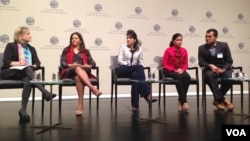WASHINGTON DC - Outspoken housing rights activist Tep Vanny and other women leaders met at the United States Institute of Peace in Washington on Thursday to discuss how more women leaders can be involved in their communities and national politics.
“We feel connected to each other like never before through modern technology and social media, yet we feel disconnected from our leaders,” said Alyse Nelson, president of Vital Voices Global Partnership. “We need a different kind of leadership.”
Women can often provide that kind of leadership, she said. “Women are those that cross the line that divides. Women are innovators. Women lead in sustainable ways because they pull others along.”
Vital Voices, which was founded by former secretary of state Hillary Clinton in 1997, gave Tep Vanny a leadership award alongside other activists in a ceremony earlier this week. She was awarded for her work campaigning for housing following forced evictions of thousands of families in the Boeung Kak lake development in Phnom Penh.
Tep Vanny told the gathering at USIP Thursday that women can provide another kind of leadership and avoid violence in often volatile campaigns.
“We want housewives to stand up to show the public that we, the women, struggle through non-violent and peaceful means,” she said. “We exercise our rights based on the law.”
That kind of advocacy is not without risks, she said.
“When I decided to get involved in the community work to demand our rights against the government development scheme that was not transparent, I knew that I could face arrest, violence, and death,” she said. “Every time I step out of my house, I never feel that I will be able to return home, but we feel we have to do this.”
Other women leaders shared their own experiences and vision, saying women can take on many roles often thought of as the arena for men.
Sandra Gomes Melo, director of the Civil Police Academy in Brasilia, Brazil, said she believes real democracy requires strong law enforcement, where women also have a role.
“For this I have been working so hard, because as a member of a law enforcement organization, our government, I need to protect people,” she said. “We need to turn to the law to be effective, because we can only have democracy on paper.”
Manal Yaish Zraiq, of the Businesswomen's Network Middle East and North Africa Economic Empowerment, said women can be risk takers, but their goals are to live happily, despite many unfavorable conditions. “There is always hope and there is always something that we can do for our country,” she said. “We don’t just want to leave the country and to go outside to live happily. If we do that it will be empty.”
“We feel connected to each other like never before through modern technology and social media, yet we feel disconnected from our leaders,” said Alyse Nelson, president of Vital Voices Global Partnership. “We need a different kind of leadership.”
Women can often provide that kind of leadership, she said. “Women are those that cross the line that divides. Women are innovators. Women lead in sustainable ways because they pull others along.”
Vital Voices, which was founded by former secretary of state Hillary Clinton in 1997, gave Tep Vanny a leadership award alongside other activists in a ceremony earlier this week. She was awarded for her work campaigning for housing following forced evictions of thousands of families in the Boeung Kak lake development in Phnom Penh.
Tep Vanny told the gathering at USIP Thursday that women can provide another kind of leadership and avoid violence in often volatile campaigns.
“We want housewives to stand up to show the public that we, the women, struggle through non-violent and peaceful means,” she said. “We exercise our rights based on the law.”
That kind of advocacy is not without risks, she said.
“When I decided to get involved in the community work to demand our rights against the government development scheme that was not transparent, I knew that I could face arrest, violence, and death,” she said. “Every time I step out of my house, I never feel that I will be able to return home, but we feel we have to do this.”
Other women leaders shared their own experiences and vision, saying women can take on many roles often thought of as the arena for men.
Sandra Gomes Melo, director of the Civil Police Academy in Brasilia, Brazil, said she believes real democracy requires strong law enforcement, where women also have a role.
“For this I have been working so hard, because as a member of a law enforcement organization, our government, I need to protect people,” she said. “We need to turn to the law to be effective, because we can only have democracy on paper.”
Manal Yaish Zraiq, of the Businesswomen's Network Middle East and North Africa Economic Empowerment, said women can be risk takers, but their goals are to live happily, despite many unfavorable conditions. “There is always hope and there is always something that we can do for our country,” she said. “We don’t just want to leave the country and to go outside to live happily. If we do that it will be empty.”








